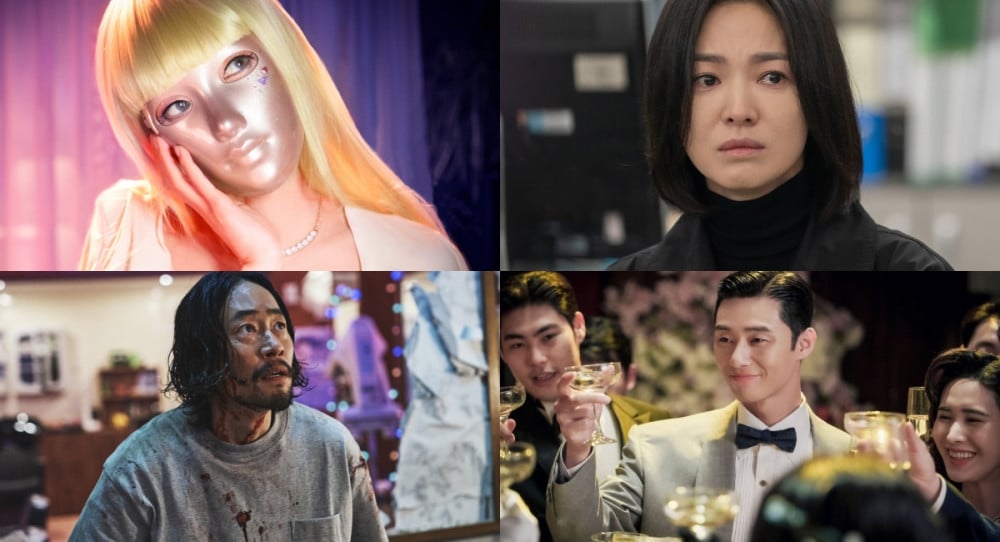
This year, streaming companies and broadcasters witnessed their high-budget K-dramas struggle in terms of both ratings success and critical acclaim. Despite efforts to increase scale and provide higher-quality visuals, industry critics suggest that a coherent and engaging storyline is the more important factor when delivering entertainment.
On December 31 KST, Netflix officially announced weekly viewership counts. According to this data, 'Mask Girl' was the very last K-drama to top the Global charts, having done so back in the week of August 21-27. Following 'Mask Girl,' Netflix also released other Korean original dramas like 'A Time Called You,' 'Song of the Bandits,' 'Doona!,' 'Daily Dose of Sunshine,' and 'Sweet Home 2.' However, none of these productions managed to claim the top spot globally.
Among them, 'Song of the Bandits' was known for its production budget of 36 billion won ($27.8 million USD), and 'Sweet Home 2' invested more than the previous season, allocating 3 billion won ($2.3 million USD) per episode. However, neither was able to deliver on their expected performance.
Earlier this year, after the success of 'The Glory,' Netflix's Korean original dramas like 'Black Knight,' 'Bloodhounds,' and 'Celebrity' easily secured the top spot globally when released. However, recent works have received disappointing reviews compared to the consistent streak of past successes.
Instances of substantial investment without meeting expectations aren't confined to Netflix but are also easily found in more traditional broadcast dramas. SBS drama 'The Escape of the 7,' which concluded last month, garnered attention as a drama written by 'Penthouse' screenwriter Kim Sun Ok with a production budget of over 46 billion won ($35.5 million). Despite pre-broadcast hype, it received criticism for its sensationalized setup and weak storyline and hovered around 5-6% in viewership ratings.
tvN's 2019 drama 'Arthdal Chronicles' is another example of this. The network had invested a groundbreaking 54 billion won ($41.7 million USD) in production. However, it struggled to maintain its 4% range viewership due to criticisms about its poorly constructed universe and awkward settings. It was reported that tvN drastically reduced the production budget for the sequel 'Arthdal Chronicles: The Sword of Aramun,' which aired in the latter half of this year. However, the reception for this season didn't significantly improve compared to its predecessor, maintaining viewership in the 2-5% range.
It is not unusual for high production budgets not to guarantee success in popularity or artistic quality. While a hefty budget can enhance visual spectacles and production quality, it doesn't ensure entertainment solely through these aspects. Examples like Disney+'s successful 'Moving' and KBS's 'Korea–Khitan War' show that their success wasn't solely due to extravagant visuals or perfection, but rather because of their robust storytelling and compelling characters.
Dramas that achieved global success this year, such as 'The Glory' or last year's hit 'Extraordinary Attorney Woo,' didn't rely solely on high production budgets or overwhelming visuals. Experts emphasize the intrinsic enjoyment of a drama's storyline, stating that a high production budget doesn't guarantee success.
In a report published by Yonhap News, pop culture critic Jung Deok Hyun commented, "The most crucial aspect of a drama is the strength of its narrative, which is its essence and core." He added that he felt most Korean works released this year deviated from this essence.
He added, "The success of 'Moving' was attributed to the compelling story crafted by its screenwriter Kang Full, and 'The Glory' succeeded due to the narrative's strength. [...] Even with significant investment, a good piece of work must have substantial content."
In the same report, Yoon Suk Jin, a professor of Korean literature and drama critic at Chungnam National University, also stated, "The most important thing in a drama is how well-crafted the scenarios that occur with the characters are." He analyzed that works neglecting the fundamental narrative in favor of entertainment spectacle struggle.
Netflix recently released the first few episodes of 'Gyeongseong Creature,' a mega-project that spent 70 billion won ($54.1 million USD) in total. However, initial viewer reviews are lukewarm. The drama is a genre piece set against the backdrop of Seoul during the Japanese colonial rule in 1945 and, as the title implies, includes monsters. Before its release, it gained attention by casting popular actors Han So Hee and Park Seo Jun in leading roles.
While it is receiving acclaim for its lavish sets and costumes, its success results only from the effects of a significant budget, and there is considerable disappointment among Korean viewers. The drama received a low rating of 2.5 out of 5 on review site WatchaPedia, and among over 400 comments from viewers, many criticize its cliche elements and lack of clarity in genre.
It is too early to evaluate the commercial success and artistic quality of 'Gyeongseong Creature,' but it already ranks among the top three in weekly viewership on Netflix, hinting at potential success. The evaluation might change when the second half of the episodes is released.
Pop culture critic Kim Sung Soo stated, "'Gyeongseong Creature' realistically portrayed issues related to comfort women under Japanese colonial rule and dealt with the Japanese Unit 731 that conducted biological experiments. It's praiseworthy for these aspects alone."
Part 2 of 'Gyeongseong Creature' is scheduled to be released on January 5. The release date of season 2, whose filming has already wrapped up, has yet to be announced.